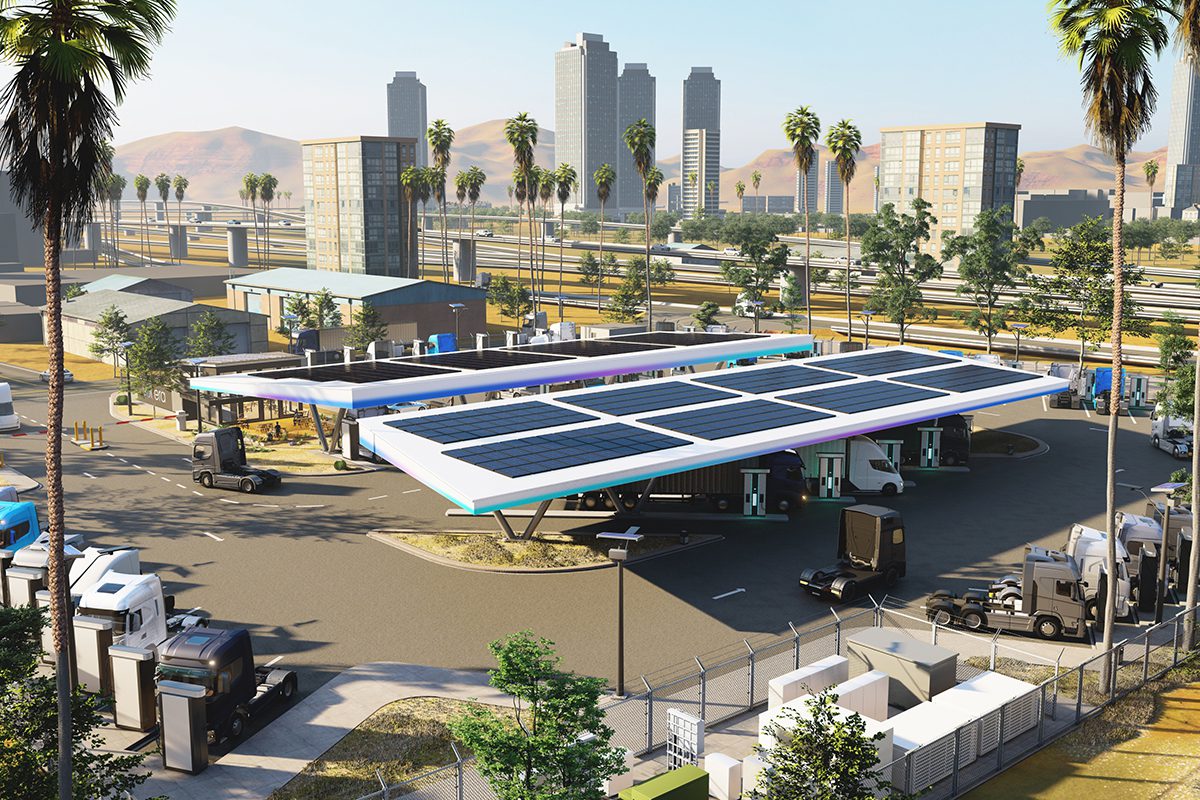With electric vehicle (EV) technology and its associated infrastructure getting more mature by the day, fleets are beginning to focus on their individual transitions to zero-emission vehicles. But like any evolution, the progression takes time — with start-to-finish timelines for larger charging sites extending over 24 months.
While some fleets have plenty of onsite real estate to plan and plot out charging infrastructure, many fleets must look for an off-site — but nearby — location that can act as a charging depot for their battery-electric vehicles. This adds another level of planning to an already complicated process, especially for fleets with little or no experience in finding, financing, purchasing, and developing commercial real estate.
Fleet’s Top Challenge — Funding the Purchase of Vehicles and Infrastructure
There is a historic amount of federal funding thanks to the $1.2 trillion Infrastructure Investment and Jobs Act, which included $165 billion for EV programs, and the $369 billion Inflation Reduction Act package, which contained tax credits and grant programs for EVs, along with state incentives. But is this enough to offset the associated costs of purchasing EVs and installing the proper infrastructure? In many cases, no.
The available incentives for charging infrastructure are not a complete solution for fleets, many of which struggle to secure the necessary upfront capital. Add current interest rates and the overall financial landscape, and the issues are compounded. The current grant and incentive programs might only be a short-term solution, as future funding is not guaranteed. This paints an uncertain outlook for fleets wanting — and in some cases needing — to electrify.
Complicating Factors Abound
The lack of commercial real estate experience can put a damper on the need for speed that some fleets are starting to experience in terms of electrification. Whether it’s established corporate sustainability goals, lack of available vehicles, delayed charging and infrastructure equipment, or upcoming regulatory action, fleets are scrambling to get the ball rolling to set up the right charging infrastructure to meet their EV needs.
Make no mistake, the drive to reduce emissions is accelerating for transportation companies. As more and more companies set sustainability and emission-reduction goals for themselves and their business partners, more fleets are getting the spotlight for their visible greenhouse gas emissions and the developing technologies that can help reduce them. This is compelling many companies to move from diesel and near-zero fuels to zero-emission technologies like battery-electric vehicles.
In addition, the supply chain miseries that were compounded by COVID-19 are having a long-term effect on the production of EVs and their necessary charging equipment. OEMs are seeing delays in receiving the essential raw materials and components to build EVs quick enough to meet demand. These effects have reached beyond the vehicle manufacturers and are also slowing the production of infrastructure equipment, as well the components like medium-voltage switchgear necessary to tap into the electrical grid.
Even after you’ve selected and purchased the right site, and lined up the vehicles and charging equipment, there is still a way to go and hurdles to overcome, such as complex permitting and utility interconnection processes.
Finding Solutions with the Right Partner
Fortunately, the market has recently seen new business models from partners offering all-in-one solutions, from vehicles and infrastructure to everything in between. These as-a-service models try to ease the stress and challenges that bar many fleets from reaching their sustainability goals. Voltera takes on these challenges head-on, buying a site, procuring megawatts of power, developing and operating charging sites, which allows fleets to focus on their job at hand, providing effective and streamlined transportation services to their customers.
Backed by billions in capital from EQT, and a team with deep experience delivering charging assets as well as critical infrastructure expertise, Voltera oversees a portfolio of EV charging sites already under development to help you deploy and operate EVs at scale. From site identification and acquisition to power procurement, design, installation, and daily operation, Voltera’s charging facilities are simplified solutions that turn charging infrastructure and operations into an ordinary operating cost for fleets, and that partnership model is powering the acceleration towards nationwide zero-emission commercial transportation.
For more information on Voltera, check out Real Estate Identification & Acquisition Is a Key Challenge for Electrification at Scale, the first in a series of playbooks available to companies interested in electrifying their fleets and cutting transportation-related emissions.


